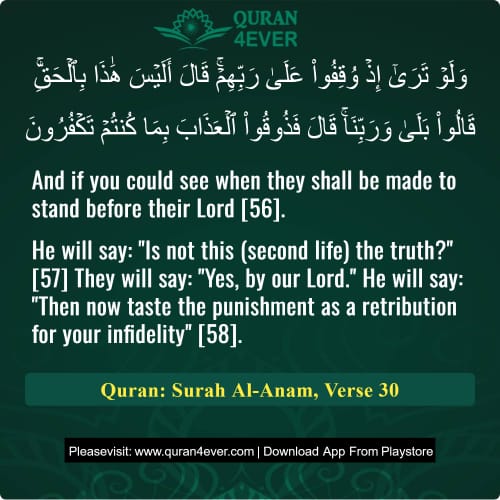
Transliteration:( Wa law taraa iz wuqifoo 'alaa Rabbihim; qaala alaisa haazaa bilhaqq; qaaloo balaa wa Rabbinaa; qaala fazooqul 'azaaba bimaa kuntum takfuroon )
"And if you could see when they shall be made to stand before their Lord [56]. He will say: 'Is not this (second life) the truth?' [57] They will say: 'Yes, by our Lord.' He will say: 'Then now taste the punishment as a retribution for your infidelity.'" [58]
On the Day of Judgement, the disbelievers will be made to stand before Allah Almighty, but they will be undercover—deprived of seeing Him. The vision of Allah is a special honour reserved only for the believers in Paradise. As Allah states: "Yes, certainly they are deprived of the sight of their Lord that day." (Surah 83:15). This deprivation itself is a form of punishment.
When Allah asks, "Is not this the truth?", it is not due to any lack of knowledge, but to make the disbelievers acknowledge the reality they had long denied. Their confession will expose the depth of their rejection and confirm the justice of their punishment.
The response, "Then now taste the punishment..." may either be the words of angels, attributed to Allah as His agents, or Allah Himself addressing the disbelievers in anger. There is no contradiction with other verses that say Allah will not speak to the disbelievers—those refer to words of mercy, while this verse represents His address of wrath and justice.
The tafsir of Surah Al-Anam verse 30 by Ibn Kathir is unavailable here.
Please refer to Surah Anam ayat 27 which provides the complete commentary from verse 27 through 30.
(6:30) If you could but see when they will be made to stand before their Lord. He will say: ‘Is not this the truth?’ They will say: ‘Yes indeed, by our Lord.’Whereupon He will say: ‘Taste the chastisement, then, for your denying the Truth.’
There is no commentary by Abul Maududi available for this verse.

For a faster and smoother experience,
install our mobile app now.
Related Ayat(Verses)/Topics